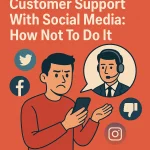Many small businesses find getting to grips with social media to be a troublesome aspect of online promotion. They often oversell and alienate potential followers, go overboard with sharing to the point of spamming, or set up a Facebook page or Twitter account, send a tweet or two, and then completely forget about it.
Social media for businesses is a marketing tool, and as with all marketing tools its use has to be consonant with overarching business goals. But, it’s not as simple as filling a page with products and declaiming how awesome you and your team are.
In creative writing classes, students are often told that the number one rule is “show, don’t tell”. The same rule can be applied to social media. Brands need to demonstrate their value to potential followers and sharers, rather than declaring it in overwrought PR speak or heavy product promotion. Authenticity is key.
For small businesses, the most authentic voices are the owners and employees themselves. To attract qualified followers – those that will convert at some point, or share to others that will – an authentic, personal voice that shows a credible understanding of the needs of customers and the intricacies of the business’ products or services is vital.
However, as any creative writer will tell you, projecting that sort of authenticity is no easy task, which is why many well-meaning social marketing efforts fall flat. An example of when social marketing from within a company often goes awry is when dissatisfied customers make use of social media platforms to air their grievances.
Businesses have a reflexive urge to defend their products and the business’ reputation, which leads to an overly defensive attitude and the deleting of negative posts. Unfortunately, very often that makes businesses look shifty and inauthentic, and the very act of trying to cover up negative judgments can lead to them being more widely publicized. Social media users are very sensitive to in authenticity and perceived dishonesty. A social media manager can train business owners and their staff to handle these situations with more grace.
There are many other cases where a social media professional can be of use, including the creation of an editorial calendar that plans appropriate social media content for promoting a business’ wider goals, finding and building relationships with niche influencers, training staff to properly interact with customers online, and so on.
So, while there is considerable value to hiring a social media expert, any decent social media strategist will not advise a business to completely outsource all of their social media interactions, but will rather help train staff and develop a strategy that a business can work within to deal with customers and influences in a way which confers maximum benefit.



